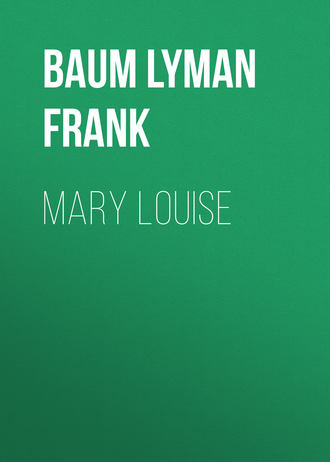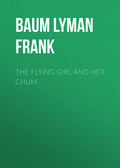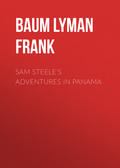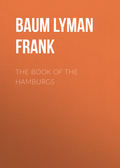
Лаймен Фрэнк Баум
Mary Louise
CHAPTER IX
OFFICER O'GORMAN
Mary Louise returned to her room and sat down to consider the best way out of her dilemma. The detective's friendliness, so frankly expressed, pleased her, in a way, yet she realized his vigilance would not be relaxed and that he was still determined, through her, to discover where Gran'pa Jim was hidden.
An uncomfortable degree of danger had already been incurred by her unconsciously leading the officer to Dorfield. He knew now that the man he was seeking was either in this city or its immediate neighborhood. But unless she led him to the exact spot – to the dwelling of the Conants – it would take even this clever detective some time to locate the refugee. Before then Mary Louise hoped to be able to warn Gran'pa Jim of his danger. That would prevent her from rejoining him and her mother, but it would also save him from arrest.
Glancing around her comfortable room she saw a telephone on the wall. Beside it, on a hook, hung the book containing the addresses of the subscribers. She opened the book and glancing down its columns found:
"Conant, Peter; r. 1216 Oak St. Blue 147."
Why hadn't she thought of this simple method of communication before? It would be quite easy to call Mr. Conant and tell him where she was and have him warn Gran'pa Jim that a detective was searching for him.
She went to the telephone and took down the receiver.
"Office!" cried a sharp voice. "What number do you want?"
Mary Louise hesitated; then she hung up the receiver without reply. It occurred to her that the hotel office was a public place and that the telephone girl would be likely to yell out the number for all to overhear.
To satisfy herself on this point she went down stairs in the elevator and purchased a magazine at the news stand. The telephone desk was near by and Mary Louise could hear the girl calling the numbers and responding to calls, while not six feet from her desk sat a man whose person was nearly covered by a spread newspaper which he appeared to be reading. But Mary Louise knew him by his striped trousers and straightway congratulated herself on her caution. Undoubtedly the detective had figured on her telephoning and she had nearly fallen into the trap.
Back to her room she went, resolved to make no further move till morning. The day had been a hard one for the girl, mentally and physically, and at this moment she felt herself hopelessly involved in a snare from which she could see no means of escape. She read a little in her magazine, to quiet her nerves, and then went to bed and fell asleep.
At daybreak Mary Louise wakened to wonder if she had done right in running away from Miss Stearne's school. Gran'pa Jim had placed her there because he did not wish to take her with him when he left Beverly, and now she had come to him without his consent and in doing so had perhaps delivered him into the hands of his enemies. Poor Gran'pa Jim! She would never cease to reproach herself if she became responsible for his ruin.
As she lay in bed, thinking in this vein, she allowed herself to wonder for the first time why her dear grandfather was being persecuted by the officers of the law – by the Government of the United States, indeed, which should be just and merciful to all its people. Of course he was innocent of any wrong-doing; Gran'pa Jim would never do anything to injure a human being, for he was goodness itself and had taught her to honor truth and righteousness ever since she could remember. Never for a moment would she doubt him. But it was curious, when she came to reflect upon it, that he would run away from his enemies instead of facing them bravely. For many years he had hidden himself – first in one place and then in another – and at the first warning of discovery or pursuit would disappear and seek a new hiding-place. For she now realized, in the light of her recent knowledge, that for many years Gran'pa Jim had been a fugitive from the law, and that for some unknown reason he dared not face his accusers.
Some people might consider this an evidence of guilt, but Mary Louise and Gran'pa Jim had been close comrades for two years and deep in her heart was the unalterable conviction that his very nature would revolt against crime of any sort. Moreover – always a strong argument in her mind – her mother had steadfastly believed in her grandfather and had devoted herself to him to the exclusion of all else in her life, even neglecting her own daughter to serve her father. Mamma Bee loved her, she well knew, yet Mary Louise had never enjoyed the same affectionate intercourse with her mother that she had with her grandfather, for Mamma Bee's whole life seemed to center around the old Colonel. This unusual devotion was proof enough to Mary Louise that her grandfather was innocent, but it did not untangle the maze.
Looking back over her past life, she could recall the many sudden changes of residence due to Colonel Weatherby's desire to escape apprehension by the authorities. They seemed to date from the time they had left that big city house, where the child had an especial nurse and there were lots of servants, and where her beautiful mother used to bend over her with a good-night kiss while arrayed in dainty ball costumes sparkling with jewels. Mary Louise tried to remember her father, but could not, although she had been told that he died in that very house. She remembered Gran'pa Jim in those days, however, only he was too busy to pay much attention to her. Let's see; was he called "Colonel Weatherby" in those days! She could not recollect. That name did not become familiar to her until long afterward. Always he had been just "Gran'pa Jim" to her. Yet that dreadful officer of the law who had questioned her in Beverly had called him "Hathaway – James J. Hathaway." How absurd!
But where had she heard the name of Hathaway before? She puzzled her brain to remember. Did it belong to any of her schoolgirl friends? Or was it —
With a sudden thought she sprang from her bed and took her watch from the dresser. It was an old watch, given her by Mamma Bee on the girl's twelfth birthday, while she was living with the Conants, and her mother had bidden her to treasure it because it had belonged to her when she was a girl of Mary Louise's age. The watch was stem-winding and had a closed case, the back lid of which had seldom been opened because it fitted very tightly. But now Mary Louise pried it open with a hatpin and carried it to the light. On the inside of the gold case the following words were engraved:
"Beatrice Hathaway, from her loving Father."
Mary Louise stared at this inscription for a long while. For the first time, ugly doubts began to creep into her heart. The officer was right when he said that James Hathaway was masquerading under the false name of Colonel Weatherby. Gran'pa Jim had never told even Mary Louise that his real name was Hathaway; Mamma Bee had never told her, either. With a deep sigh she snapped the case of the watch in place and then began to dress.
It was still too early for breakfast when she had finished her toilet, so she sat by the open window of her room, looking down into the street, and tried to solve the mystery of Gran'pa Jim. Better thoughts came to her, inspiring her with new courage. Her grandfather had changed his name to enable him the more easily to escape observation, for it was James Hathaway who was accused, not Colonel James Weatherby. It was difficult, however, for the girl to familiarize herself with the idea that Gran'pa Jim was really James Hathaway; still, if her mother's name before her marriage was indeed Beatrice Hathaway, as the watch proved, then there was no question but her grandfather's name was also Hathaway. He had changed it for a purpose and she must not question the honesty of that purpose, however black the case looked against her beloved Gran'pa Jim.
This discovery, nevertheless, only added to the mystery of the whole affair, which she realized her inability to cope with. Grouping the facts with which she was familiar into regular order, her information was limited as follows:
Once Gran'pa Jim was rich and prosperous and was named Hathaway. He had many friends and lived in a handsome city house. Suddenly he left everything and ran away, changing his name to that of Weatherby. He was afraid, for some unknown reason, of being arrested, and whenever discovery threatened his retreat he would run away again. In this manner he had maintained his liberty for nine years, yet to-day the officers of the law seemed as anxious to find him as at first. To sum up, Gran'pa Jim was accused of a crime so important that it could not be condoned and only his cleverness in evading arrest had saved him from prison.
That would look pretty black to a stranger, and it made even Mary Louise feel very uncomfortable and oppressed, but against the accusation the girl placed these facts, better known to her than the others: Gran'pa Jim was a good man, kind and honest. Since she had known him his life had been blameless. Mamma Bee, who knew him best of all, never faltered in her devotion to him. He was incapable of doing an evil deed, he abhorred falsehood, he insisted on defending the rights of his fellow men. Therefore, in spite of any evidence against him Mary Louise believed in his innocence.
Having settled this belief firmly in mind and heart, the girl felt a distinct sense of relief. She would doubt no more. She would not try, in the future, to solve a mystery that was beyond her comprehension. Her one duty was to maintain an unfaltering faith.
At seven o'clock she went to the breakfast room, to which but two or three other guests of the hotel had preceded her, and in a few minutes Detective O'Gorman entered and seated himself at a table near her. He bowed very respectfully as he caught her eye and she returned the salutation, uneasy at the man's presence but feeling no especial antagonism toward him. As he had said, he was but doing his duty.
O'Gorman finished his breakfast before Mary Louise did, after which, rising from his chair, he came toward her table and asked quietly:
"May I sit at your table a moment, Miss Burrows?"
She neither consented nor refused, being taken by surprise, but
O'Gorman sat down without requiring an answer.
"I wish to tell you," he began, "that my unpleasant espionage of you is ended. It will be needless for me to embarrass or annoy you longer."
"Indeed?"
"Yes. Aren't you glad?" with a smile at her astonished expression. "You see, I've been busy investigating while you slept. I've visited the local police station and – various other places. I am satisfied that Mr. Hathaway – or Mr. Weatherby, as he calls himself – is not in Dorfield and has never located here. Once again the man has baffled the entire force of our department. I am now confident that your coming to this town was not to meet your grandfather but to seek refuge with other friends, and so I have been causing you all this bother and vexation for nothing."
She looked at him in amazement.
"I'm going to ask you to forgive me," he went on, "and unless I misjudge your nature you're not going to bear any grudge against me. They sent me to Beverly to watch you, and for a time that was a lazy man's job. When you sold some of your jewelry for a hundred dollars, however, I knew there would be something doing. You were not very happy at your school, I knew, and my first thought was that you merely intended to run away – anywhere to escape the persecution of those heartless girls. But you bought a ticket for Dorfield, a faraway town, so I at once decided – wrongly, I admit – that you knew where Hathaway was and intended going to him. So I came with you, to find he is not here. He has never been here. Hathaway is too distinguished a personage, in appearance, to escape the eye of the local police. So I am about to set you free, my girl, and to return immediately to my headquarters in Washington."
She had followed his speech eagerly and with a feeling of keen disappointment at his report that her grandfather and her mother were not in Dorfield. Could it be true?
Officer O'Gorman took a card from his pocket-book and laid it beside her plate.
"My dear child," said he in a gentle tone, "I fear your life is destined to be one of trials and perplexities, if not of dreary heartaches. I have watched over you and studied your character for longer than you know and I have found much in your make-up that is interesting and admirable. You remind me a good deal of my own Josie – as good and clever a girl as ever lived. So I am going to ask you to consider me your friend. Keep this card and if ever you get into serious difficulty I want you to wire me to come and help you. If I should happen, at the time, to have duties to prevent my coming, I will send some other reliable person to your assistance. Will you promise to do this?"
"Thank you, Mr. O'Gorman," she said. "I – I – your kindness embarrasses me."
"Don't allow it to do that. A detective is a man, you know, much like other men, and I have always held that the better man he is the better detective he is sure to prove. I'm obliged to do disagreeable things, at times, in the fulfillment of my duty, but I try to spare even the most hardened criminal as much as possible. So why shouldn't I be kind to a helpless, unfortunate girl?"
"Am I that?" she asked.
"Perhaps not. But I fear your grandfather's fate is destined to cause you unhappiness. You seem fond of him."
"He is the best man in all the world!"
O'Gorman looked at the tablecloth rather than to meet her eyes.
"So I will now say good-bye, Miss Burrows, and – I wish you the happiness you deserve. You're just as good a girl as my Josie is."
With this he rose to his feet and bowed again. He was a little man and he had a fat nose, but Mary Louise could not help liking him.
She was still afraid of the detective, however, and when he had left the dining room she asked herself if his story could be true, if Gran'pa Jim was not in Dorfield – if he had never even come to the town, as O'Gorman had stated.
The Conants would know that, of course, and if the detective went away she would be free to go to the Conants for information. She would find shelter, at least, with these old friends.
As she passed from the dining room into the hotel lobby Mr. O'Gorman was paying his bill and bidding the clerk farewell. He had no baggage, except such as he might carry in his pocket, but he entered a bus that stood outside and was driven away with a final doff of his hat to the watching girl.
Mary Louise decided in the instant what to do. Mr. Peter Conant was a lawyer and had an office in one of the big buildings down-town. She remembered that he always made a point of being in his office at eight o'clock in the morning, and it was nearly eight now. She would visit Mr. Conant in his office, for this could not possibly endanger the safety of Gran'pa Jim in case the detective's story proved false, or if an attempt had been made to deceive her. The man had seemed sincere and for the time being he had actually gone away; but she was suspicious of detectives.
She ran upstairs for her coat and hat and at once left the hotel. She knew the way to Peter Conant's office and walked rapidly toward it.
CHAPTER X
RATHER QUEER INDEED
Mary Louise found the door of the office, which was located on the third floor of the Chambers Building, locked. However, the sign: "Peter Conant, Attorney at Law," was painted on the glass panel in big, distinct letters, so she was sure she had made no mistake. She slowly paced the hall, waiting, until the elevator stopped and Mr. Conant stepped out and approached the door, his morning paper in one hand, a key in the other. Running to him, the girl exclaimed:
"Oh, Mr. Conant!"
He stopped short and turned to face her. Then he stepped a pace backward and said:
"Great heavens, it's Mary Louise!"
"Didn't you recognize me?" she asked.
"Not at first," he answered slowly. "You have grown tall and – and – older, in two years."
"Where is Gran'pa J-"
"Hush!" with a startled glance up and down the hall. Then he unlocked the door and added: "Come in."
Mary Louise followed him through the outer office and into a smaller room beyond, the door of which Mr. Conant carefully closed after them. Then he turned to look steadily at the girl, who thought he did not seem especially delighted at her appearance in Dorfield. Indeed, his first words proved this, for he asked sternly:
"Why are you here?"
"I left the school at Beverly because the girls made it so uncomfortable for me there that I could not bear it longer," she explained.
"In what way did they make it uncomfortable for you?"
"They jeered at me because – because – Gran'pa Jim is being hunted by the officers of the law, who accuse him, of doing something wicked."
Mr. Conant frowned.
"Perhaps their attitude was only natural," he remarked; "but there was no accusation against you, my child. Why didn't you stick it out? The scandal would soon have died away and left you in peace."
"I was unhappy there," she said simply, "and so I thought I would come here to mother and Gran'pa Jim."
"Here?" as if surprised.
"Yes. Aren't they here, with you?"
"No."
"Then where are they?"
"I've no idea."
She sat still and stared at him, while he regarded her with a thoughtful and perplexed look on his face.
Mr. Conant is difficult to describe because he was like dozens of men one meets every day, at least in outward appearance. He was neither tall nor short, lean nor fat, handsome nor ugly, attractive nor repulsive. Yet Peter Conant must not be considered a nonentity because he was commonplace in person, for he possessed mannerisms that were peculiar. He would open his eyes very wide and stare at one steadily until the person became confused and turned away. The gaze was not especially shrewd, but it was disconcerting because steadfast. When he talked he would chop off his words, one by one, with a distinct pause between each, and that often made it hard to tell whether he had ended his speech or still had more to say. When very earnest or interested he would play with a locket that dangled from his watch chain; otherwise he usually stood with his hands clasped behind his back.
Mary Louise well knew these peculiarities, having previously lived in his house, and also she knew he was a kind-hearted man, devotedly attached to his deaf wife and thoroughly trusted by Gran'pa Jim.
"I was told," said the girl presently, "to direct all my letters to my grandfather in your care."
"I am aware that you have done so," he replied.
"So I thought, of course, that he and my mother were with you."
"No; they did not come here. Colonel Weatherby arranged for me to forward your letters, which I did as soon as they arrived."
"Oh; then you know his address?"
"I do not. There are six different points to which I forward letters, in rotation, both those from you and from others on various matters of business, and these points are widely scattered. My impression is that Colonel Weatherby is in none of these places and that the letters are again forwarded to him to – wherever he may be."
Mary Louise felt quite discouraged. With hesitation she asked:
"Do you suppose you could find him for me?"
"It is impossible."
"What am I to do, Mr. Conant?"
"I advise you to go back to your school."
"Can't I stay here, with you?"
He stared at her with his round eyes, playing with his locket.
"I haven't the money for the return trip," she went on falteringly. "I had to sell some of my jewelry to get here. I won't be much trouble, if you will let me live with you until I can find Gran'pa Jim."
Mr. Conant still stared.
"I'm sure," said Mary Louise, "that my grandfather will gladly repay you any money it costs you to keep me."
"You – don't – un-der-stand," he retorted, chopping off his words rather viciously. "Moreover, you can't understand. Go to the house and talk to Hannah. Have you any baggage!"
"I've a suit case at the hotel," she said, and went on to tell him the experiences of her journey and of her encounter with Detective O'Gorman.
During this relation, which he did not interrupt, Mr. Conant toyed persistently with his watch charm. His features were noncommittal but he was thoroughly interested.
"You see," he remarked when she had finished, "Colonel Weatherby's elaborate system of evading discovery is quite necessary."
"But why should he wish to hide?" asked the girl.
"Don't you know?"
"No, sir."
"Then your grandfather doesn't wish you to know. I am his lawyer – at least I am one of his lawyers – and a lawyer must respect the confidences of his clients."
Mary Louise looked at him wonderingly, for here was someone who evidently knew the entire truth.
"Do you believe my grandfather is a bad man?" she asked.
"No. I have the highest respect for Colonel Weatherby."
"Do you know his name to be Weatherby – or is it Hathaway?"
"I am his lawyer," reiterated Mr. Conant.
"Is it possible that an innocent man would change his name and hide, rather than face an unjust accusation?"
"Yes."
Mary Louise sighed.
"I will go with you to the hotel and pay your bill," said the lawyer. "Then you may go to the house and talk to Hannah. When I have talked with her myself, we will determine what to do with you."
So they went to the hotel and the girl packed her suit case and brought it downstairs.
"Queer!" said Mr. Conant to her, fingering his locket. "Your bill has been paid by that man O'Gorman."
"How impertinent!" she exclaimed.
"There is also a note for you in your box."
The clerk handed her an envelope, which she opened. "I hope to be able to send you your grandfather's address very soon," wrote O'Gorman. "You will probably stay in Dorfield; perhaps with the Conants, with whom you lived before. You might try sending Colonel Weatherby a letter in care of Oscar Lawler, at Los Angeles, California. In any event, don't forget my card or neglect to wire me in case of emergency."
Having read this with considerable surprise the girl handed the note to Mr. Conant, who slowly read it and gave a bark like that of an angry dog when he came to the name of the California attorney. Without remark he put the detective's letter in his pocket and picking up Mary Louise's suit case led the girl outside to the street corner.
"This car will take you to within two blocks of my house," he said.
"Can you manage your grip alone?"
"Easily," she assured him.
"You have carfare!"
"Yes, thank you."
"Then good-bye. I'll see you this evening."
He turned away and she boarded the street car.







